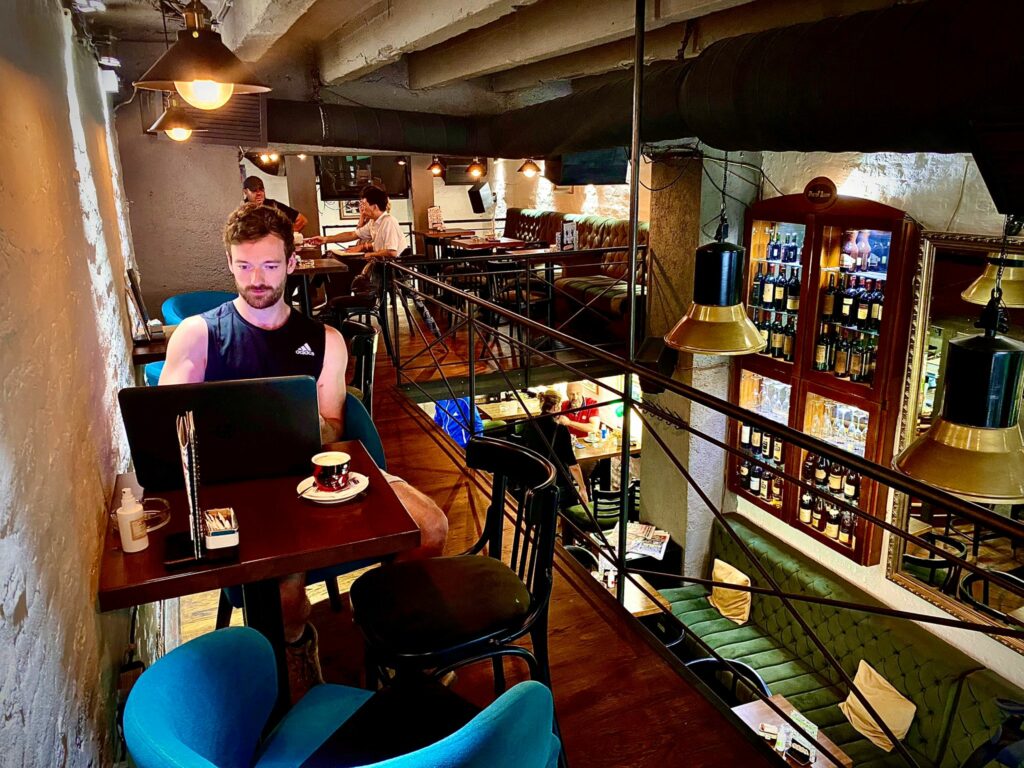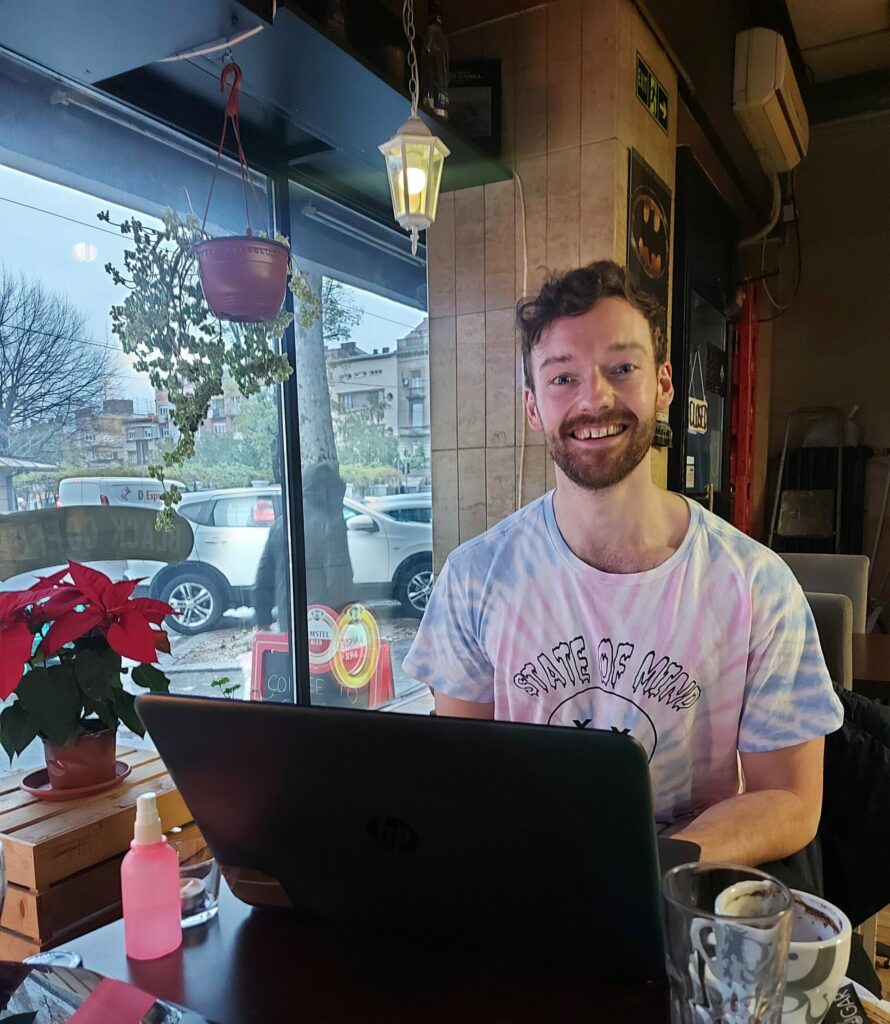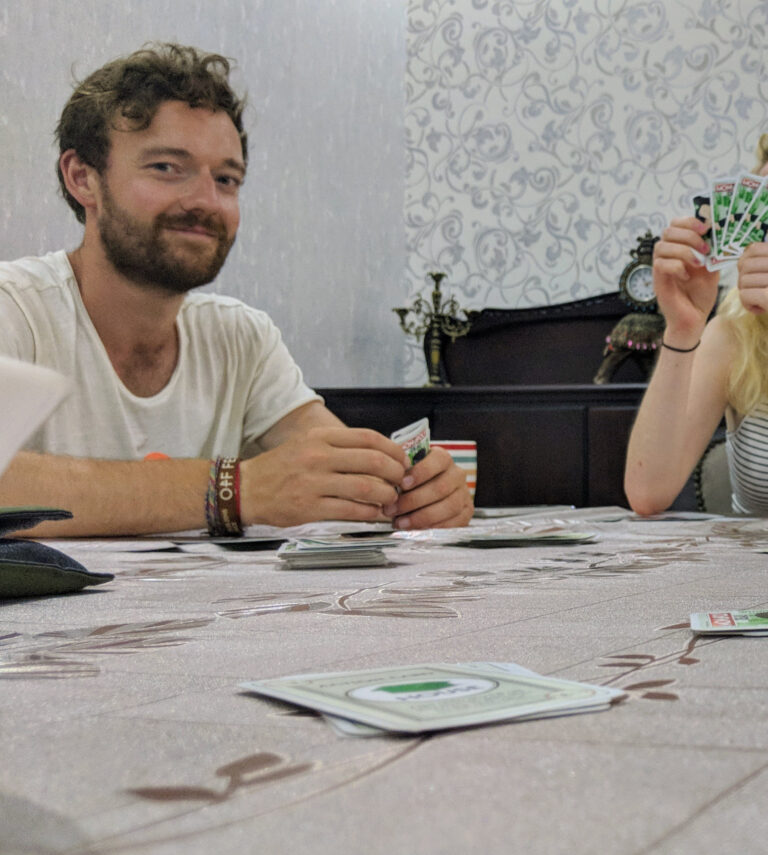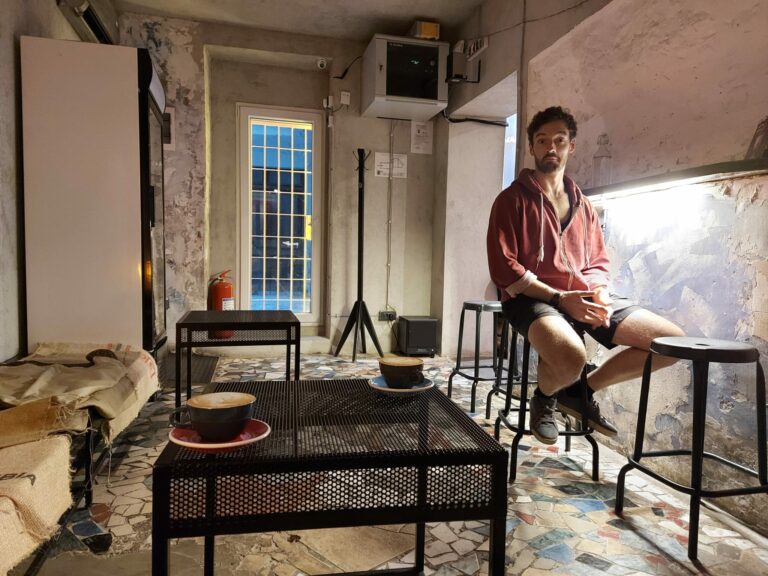How to Become a Freelance Writer With No Experience
People always want to know how to become a freelance writer with no experience.
I’ve got plenty of friends who ask me how to get started, and people always reach out online for advice.
So in this helpful guide, I’m unpacked all the details you need to know. I’ve kicked things off my story, then I’ve offered lots of dos, don’ts, advice, and helpful resources.
You can become a freelance writer with no experience, because it’s exactly what I did. And now, it’s my real life job. I make more money than I’ve ever made, I set my own schedule, I do (and don’t do) whatever work I want, and I can work from any location on the planet.
It’s not perfect, but it’s close.

How I Became a Freelance Writer With No Experience
Mainly, I lied. I was starting from absolute zero, so I opened up Word on my computer, and I wrote a couple of short pieces about stuff I thought was interesting. The first one was about a trip to Moldova that I’d been on; the second was about ‘Blue Velvet,’ the David Lynch movie.
These two documents were my ‘portfolio’. I then went on Freelancer (a platform where you can advertise yourself as basically anything and then pick up low-paid jobs in that niche) and started applying for badly-paid jobs. And I mean very badly. Like $5 for a day’s work. At the most.
When I was applying for those jobs, I sent people the two articles from my ‘portfolio,’ pretending they were articles I’d written for other ‘clients’.
And people started accepting my applications, because they thought I could write.
At first, the pay was terrible. Then it was really bad. Then it was quite bad. Then it was okay. Eventually, it became pretty good. And now, it’s great. Back then, I was earning $5 for a day’s work. Now, my average pay is around $5 for 40 words. I quickly found better-paid gigs with better clients.
Writing started as a little side job that I was using to make money while I was traveling (more on that later), then it eventually became my actual job.
(Eventually, the Moldova article actually became a professional piece, when I managed to sell it a little while later).
Anyway, the point of that big boring self-indulgent monologue is this… sometimes clichés are true. They say fake it until you make it, and in this case it was true. Pretend you’re a professional freelance writer until you really are a professional freelance writer.
Then you can write annoying ‘how-to’ posts like this one!
Why I Became A Freelance Writer
I don’t think many people become freelance writers for the love of writing. Or maybe they do, and I’m just projecting because I’m really narcissistic and I think everyone is the same as me.
Honestly, at the time, I had no interest in writing. But I had an interest in traveling (as you’ve probably worked out for yourself). So, sometime around 2015, I was due to go on a multi-month trip to Myanmar, Vietnam (where I later ended up living), Thailand, Georgia, Armenia, Azerbaijan, Germany and a couple of other places.
Anyway, I didn’t want to spend all of my savings on the trip, so I wanted to work out a way to make money while I was traveling. And freelance writing was what I stumbled upon. I thought ‘even if I can make 30% of the money I spend while I’m away, I can avoid spending all of my savings‘ (it actually ended up being 50%).
So I pretended I was a freelance writer until I actually became a freelance writer. When I was away on my trip, I was working (very) sporadically while I was traveling. And I was making money. Suddenly, I had a realization of ‘shit, people will actually pay me to do a thing I can do anywhere’. And the ability to be anywhere was (and is) the most important thing in my life.
So I write for freedom. I started writing so I could be free, and I write now because it keeps me free.
Eventually, I learned to love writing for the job itself, not just for the freedom it gave me (but the freedom is still the best part, obviously).

How Much Can Professional Writers Make?
Here’s the part you probably care about.
I earn around $40,000-$45,000 a year. And that might sound like a lot, considering I set my own schedule, and I work around 25-35 hours a week, and I can work and live wherever I want.
But there are lots of freelance writers who earn MUCH more while working much less. So in reality, I’m still starting out, and I’m still hoping to reach higher earnings with lower hours. Some freelance writers earn $200,000 or more in a year.
So the money is there, and the work is there, if you know how to get it. The problem is, most people don’t know how to get it – and even if they do, they can’t be bothered with putting in the work.
So coming up next, I’ve covered what you do and don’t need to think about (for now). Here’s how to become a freelance writer with no experience…
Things You Should Do if You Want to Become a Freelance Writer (With No Experience)
Be Honest With Yourself
Alright, you might not like this. But are you actually a competent writer? If you’re not, you’re wasting your time. You haven’t got to be a novelist or some sort of literary genius, but if you’re not okay with grammar or spelling, or if you don’t know how to create coherent content, this isn’t for you.
If you’re not a native speaker, you’ll also struggle (yeah, I know that sounds unfair, but it’s just true).
But it’s not all bad news: if you’re a native speaker with excellent English skills, you’re probably better off looking at translation. You’ll be better at it, and it’ll probably pay more.
Knock Together a Few Pieces of Content
Do what I did. Open up your computer, and write about a few things you care about. Maybe you’re interested in Marvel movies, or Stephen King books, or traveling, or food, or coffee, whatever.
If you’re interested in it, writing about it isn’t a chore, so throw together 3 or 4 pieces of content. You can use this content to prove you can write.
Sign up for Freelancing Platforms
Next, you’ve got to show off your ‘portfolio’, and use that portfolio to secure actual real-life paid work. The best place to do it, for now, is on a Freelance platform. The three best and most trusted are:
- Freelancer: The absolute best place for beginners. The pay is low, the jobs are often bad, and there are loads of talentless idiots applying for every single vacancy. But unless you’re willing to trudge through this uninspiring mire of dread and boredom, you’re not gonna get any further. It’s a brilliant platform for what it offers, but let’s be realistic about what it offers. It’s absolutely the best place to become a freelance writer with no experience.
- Upwork: This is a much better platform for finding better-paid jobs. But because of that, you need some experience before you’ll start having your applications accepted here. I still do lots of writing on Upwork now, and some of it pays around $0.15 a word.
- Fiverr: Fiverr is halfway between Freelancer and Upwork. I’ve never used it, but it’s a perfect stepping stone between the two, and lots of people absolutely love (both working and hiring on) it.
It’s best to sign up for all three. But because you’re a beginner with no experience, Freelancer is your best bet for now. Yeah, there are loads of crap jobs on there, and loads of people willing to do those crap jobs for basically no money. But you’re a beginner, so this is your market for now. Sorry kid!
Work For Very Little
I’ve mentioned this above in a lot of detail already. And I hate saying it, because I hate the market we live in, but you need to work for very little for now.
It’s annoying, and it’s not what you want to do, and it’s not how the world should work. But you’re not gonna change how things are, so you either work with that or you don’t. They’re your two options.
But on the bright side, your pay will increase QUICKLY. If you stick at it and apply for loads of stuff, you’ll probably treble your hourly rate of pay every few months. Now, what I used to make in a day, I can now make in five or ten minutes. It took me about 6 years to make that gradual transition, but my transition was slow, because in between doing freelance writing, I was also traveling lots (I’ve spent about 3 years of that 6 years outside of the UK), and working on what was my real job at the time (I was an actor, in case you’re interested*).
*I was crap at it.
You can massively expediate that pay-rise process if you focus on writing. With the right skills, dedication and approach, you can turn terrible money into liveable money within a year or two.
Most people aren’t willing to work for next-to-nothing in the beginning. And that’s why those people will never be freelance writers.
Write About Whatever
Over time, you’ll find your niche(s). Honestly, you just will. But first, you need to write about any old shit.
When I first started, I was writing about all sorts of stuff I knew nothing about: I used to write about things as varied (and weird) as sandpaper, horror festivals, kids’ running shoes, water bottles, pregnancy, and other stuff I couldn’t care less about.
But I was paid to do it, and it helped me to develop my skills, and that’s what mattered at the time.
Now though, 70% of my work is travel content, 25% is YouTube content, and the other 5% is miscellaneous stuff I pick up from new clients (through referrals from existing clients). And I love the majority of it.
At first, you’ll be writing about any old crap. And there’s not much you can do about that for now.
Find Good Places to Publish and Share Content
Okay, I’m going to be honest. I’m not the type of person who likes working for free (or on the potential promise of a small cut later down the line).
But if you have the patience for this type of stuff, there are lots of great platforms where you can advertise your services by blogging.
The most well-known is Medium, where you can quickly and easily upload articles to the website, and get people reading your articles right away. You don’t get paid as standard, but it’s a really good place to advertise your work. They even have a ‘partner program,’ which allows you to get paid if you get enough views and interaction.
Loads of really famous writers use Medium, and lots of people make very good money from it, so it’s obviously worthwhile. I haven’t used it, but I keep telling myself I should.
Another similar platform is Contently. I wish I’d used both Medium and Contently in the beginning of my writing journey. And I recommend you do too!
You should also consider guest posting. Guest posting is just where you post on another website for free, and share that post with potential new clients in order to show off your skills. If you guest post for a reputable client, you can get lots of exposure, and look all cool and trendy in the process. So if you’re interested in traveling, reach out to travel websites to see if they’re accepting guest posts. If you like sports, reach out to sports websites. You get the idea.
Take a Course
Courses can be massively useful if you want to become a freelance writer with no experience.
If you sign up to a good course, you can learn from an experienced professional writer who can walk you through the steps they’ve taken. One of the most reputable is Elna Cain’s Write to 1k Course. Honestly, I haven’t used it, but loads of people recommend it.
Coursera also has lots of great courses.
If you don’t need a full course, and you just want some help with grammar and structure and all that, Grammarly is fantastic. It’s like spellcheck on steroids.
Or just talking to a freelance writer can be just as good. I offer Zoom calls to give advice to writers, no matter how much experience they have. If you’re interested, get in touch.

Things You Don’t Need to Worry About (At First) If You Want to Become a Freelance Writer
Building a Website
When you’re pretty established, it’s good to have a website so you can advertise your skills and share your portfolio and look and professional and popular and all that stuff. But for now, you don’t need it. Focus on the writing now; focus on being all established and professional later.
Until 2019, I didn’t have a website. I then had a terrible Wix website until 2021. Only in late 2021 (6 years after I started writing) did I make a proper website (and even this one isn’t very good, because I’m a horrendous technophobe and I haven’t got a clue what I’m doing).
Having Your Own Blog
Most people probably won’t agree with me here, but I think starting a blog as a new writer is a massive waste of time. I started this blog in late 2021, 6 years after I first started freelance writing.
I waited that long because blogs are rarely profitable. Most people have this idea that they can write about whatever they care about, and they’ll suddenly make loads of money. They won’t. As a beginner, you have no idea what you’re doing, and you’ll very likely make more money writing for others than you will writing for yourself.
Yeah, entry-level freelance writing pay is horrendously low. But the profit you’ll make from a blog is even lower. I’m pretty experienced, and I still don’t expect this poorly thought-out venture to make me much money at all.
As an outreach tool, having your own blog can be useful, but Freelancer, Upwork and Fiver are better outreach tools for beginners.
Being All Professional and Serious
I think this is the most important thing to remember. This is the first piece of advice I always give.
So much online writing is boring. Like, really really boring. But it doesn’t need to be. If you write interesting stuff with a personality, people will be much more willing (and likely) to read it. Just because you’re a professional doesn’t mean you have to be all ‘professional’. If you write with the personality of someone sitting in a boring corporate office, that’s exactly what you’ll sound like.
If you write boring crap, you’re never gonna stand out. And if you can’t stand out in this game, you’re wasting your time.
Have fun. Enjoy yourself. Throw some jokes around. You’ll be dead one day, so stop taking everything so seriously.
Pitching
Again, this is controversial, but I hate pitching and I think it’s usually a terrible idea.
Pitching, in case you don’t already know, is when you write to people with an outline of an idea, in the hope that they’ll publish your article on it. Sometimes, it’s a ‘warm pitch,’ where you respond to a call-out for pitches on specific topics. Other times, you’ll ‘cold pitch,’ where you blindly contact someone with an idea.
Unless you already have a good reputation, pitching is usually pointless. The only exceptions are when you have a very good understanding of a very niche topic. I warm-pitched a story about traveling to Tajikistan to Nomadic Matt, and was quickly accepted. But it was only accepted because I had a good understanding of a niche topic.
Most of the time, I don’t bother pitching. Because like I said, I don’t like working for free, and I’d rather be paid than not paid. So for beginners, it’s mostly not a good idea.
How to Become a Freelance Writer With No Experience: Final Thoughts
Hopefully you now have a better idea of how to become a freelance writer with no experience!
If you put in the time and effort, and if you do the right things (and if you have a bit of talent or skill or whatever you want to call it), it’s 100% possible. You can live remotely, you can make a living from any place on the planet, and you don’t need to be tied to a job or a place or a life you hate.
So my last piece of advice is… go for it. Good luck kid!
If you have any questions, pop them in the comment box below, or get in contact with me.






